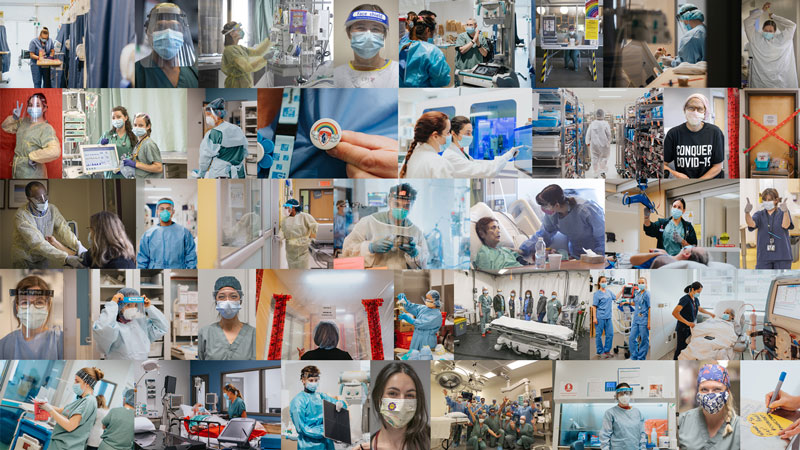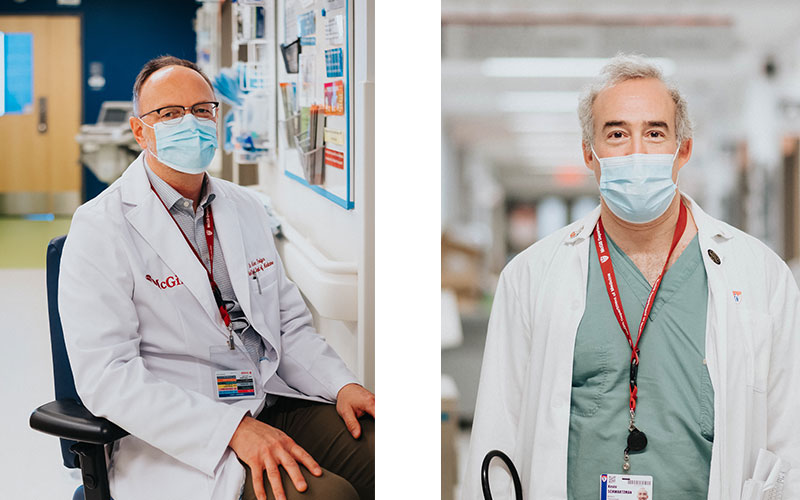Out of the comfort zone and into the red zone : a retrospective

A year ago, we were watching with incredulity the drama unfolding in Italy while the reality of the pandemic was barely tangible in Quebec. The sense of urgency that arose at the McGill University Health Centre (MUHC) gave it a jumpstart to mobilize its resources in a record time. There was no choice; we had to act quickly and prepare for the COVID-19 wave to cross the Atlantic and sweep over Quebec.
It is unanimous: if the MUHC has been able to respond so quickly to the ever-changing situation, it is thanks to teamwork. From senior management to healthcare workers and administrative staff, everyone has responded in an exceptional way. Outstanding leadership and good communication are the key ingredients for harmonious and effective work.
Dr. Marc Rodger, physician-in-chief and medical director of the Medical Mission of the MUHC is proud of it.
"It is remarkable how quickly we have been able to transform our facilities. We went from zero to nearly 140 patients with COVID-19 at the height of the crisis."
Dr. Peter Goldberg, chief of the Department of Critical Care at the MUHC, explains that when the pandemic hit, the MUHC needed to immediately increase the Intensive Care Unit (ICU) bed capacity by 50. "Even more impressive is the fact that we used that same positive attitude to bring an existing finely tuned multidisciplinary team to work ever more cohesively together, placing itself in harm’s way each day to treat gravely ill patients, with great expertise and with even deeper compassion."
Dr. Rodger and Dr. Kevin Schwartzman, director of the Division of Respiratory Medicine at the MUHC, worked closely with nursing staff and the Infection Prevention and Control Department to build the COVID ward units and find the workforce. Everything was new, and care and infection control protocols had to be developed to respond to an unprecedented health crisis.

"People have been able to turn their fear into concrete work to get through it, says Dr. Schwartzman. "In essence, it was clear to the leadership of the MUHC that whatever needed to be done to get through the ordeal was going to be done. This is our role and our commitment."
Since COVID-19 is an infectious respiratory disease, specialists in pulmonology, general internal medicine and infectious diseases were first mobilized.
"There was no way we could quadruple the resources of these kinds of specialists overnight. So we knew we had to bring in other types of specialists," says Dr. Rodger. Cardiologists, geriatricians, gastroenterologists, nephrologists, endocrinologists, rheumatologists, family physicians, pediatricians, surgeons, psychiatrists as well as physicians from many other disciplines came out of their respective specialties to assist on the COVID units. When the pandemic accelerated in the spring of 2020, with the collaboration of McGill University, residents, also stepped outside of their home disciplines to offer their support. In order to train and orient these professionals who would be working outside their areas of expertise, a matching system was put in place by Dr. Schwartzman and Dr. Rodger. Much like a resident is matched with a physician, a specialist working outside his or her specialty was matched with the physician in charge of the unit, either a pulmonologist, internist or infectious disease specialist.
|
2020 facts
|
Dr. Schwartzman recognizes the undeniable contribution of the nursing and allied health staff. "At every opportunity I get, I salute the work of these incredible colleagues. They are the ones who have taken on the biggest burden”. Alain Biron, associate director of Nursing in Clinical Practice, explains that his team has faced many unknowns and challenges.
"It's the collective effort, the team spirit that made us so effective. The hundreds of nurses who responded to the call were redeployed to the intensive care unit, COVID units, screening centers and now the vaccination clinic. It took a lot of adjustment on their part". Alain Biron attests to the great mobilization of the MUHC nursing community. "We were the first institution to deploy specialized nurse practitioners to its COVID units, and we did it in less than a week. It was a tour de force right from the first wave". Nurse practitioners were key anchors for the care teams.
Not only did our nurses help address the huge needs of COVID-19 patients at the MUHC, but they also supported our colleagues in CHSLDs and in the Saguenay—Lac-St Jean region. Both times, their expertise was certainly valuable and appreciated, making a true difference for patients and their families.
This large multidisciplinary team also includes orderlies and all paramedical staff such as respiratory therapists, perfusionists, occupational therapists and technologists, to name a few. Housekeeping, Laundry and Technical Services were greatly solicited. In fact, Technical Services transformed the MUHC facilities in record time to ensure a safe environment. There is also significant support from the administrative staff. Elements that one may find trivial are in fact very important. For example, setting up complex work schedules, ensuring that doctors had portable telephones or that rooms where on-call doctors could rest were available are details that make a difference.
Furthermore, the involvement of each and every one nurtured a culture of infection prevention and control.
A year later, where do we stand?
While the MUHC was caught up in the novelty and unknown of the health crisis back in March 2020, it was able to adapt very quickly. Many precautions were taken during the first wave, but when the second wave arrived in the fall, the institution was in a better position to assess and adjust resources as needed.
"We were much more prepared to dose the necessary resources very carefully," explains Dr. Rodger. "We managed our facilities meticulously in order to continue the other activities of the hospital and we were able to put in place adjustable schedules to accommodate the intensity of demand. "
The past year has unquestionably taught the actors who have fought against the pandemic many lessons. "It makes us reflect on our responsibilities as healthcare professionals. Fundamentally, our job is to take care of our patients; it's what makes us who we are. Keeping that commitment in mind, as our priority, is what is helping us get through the crisis," says Dr. Schwartzman. "It reminds us that medicine and healthcare is complex and that it's really a team effort".
The battle is not yet won, and the vaccination campaign continues to move forward, but at the end of the first year, a sense of pride fills the MUHC. We have come through two waves that have helped us grow, and we are ready for the next year.
To read :
- https://muhc.ca/news-and-patient-stories/articles/muhc-celebrates-rt-week
- https://muhc.ca/news-and-patient-stories/coronavirus/muhc-infection-prevention-and-control-team-guiding-light
- https://muhc.ca/news-and-patient-stories/articles/mgh-resuscitation-tent-provides-critical-support-and-space-during
Les Champions du CUSM :
- https://muhc.ca/news-and-patient-stories/coronavirus/champions-medical-imaging
- https://muhc.ca/news-and-patient-stories/articles/champions-triage
- https://muhc.ca/news-and-patient-stories/articles/champions-lachine-hospital
- https://muhc.ca/news-and-patient-stories/articles/champions-occupational-therapy
